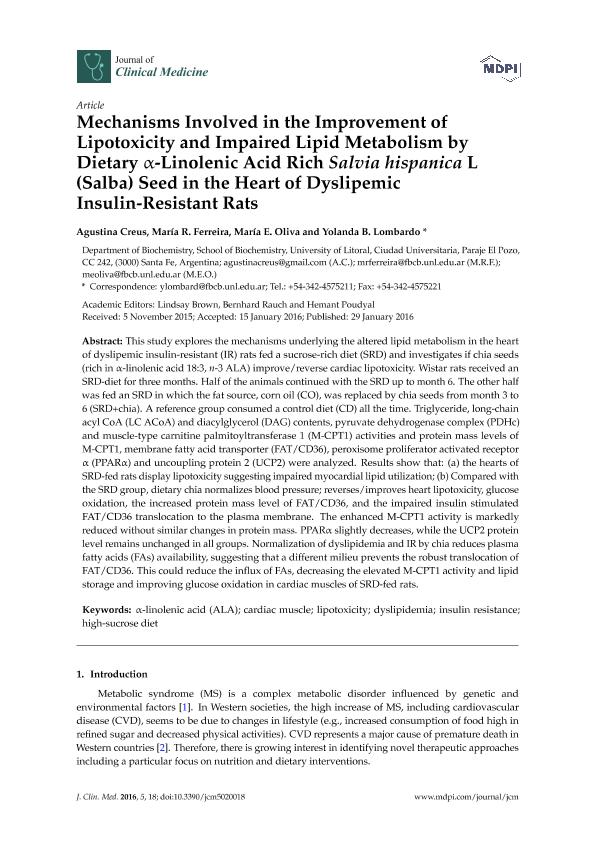Artículo
Mechanisms involved in the improvement of lipotoxicity and impaired lipid metabolism by dietary α-linolenic acid rich salvia hispanica L (Salba) seed in the heart of dyslipemic insulin-resistant rats
Fecha de publicación:
01/2016
Editorial:
Multidisciplinary Digital Publishing Institute
Revista:
Journal of Clinical Medicine
ISSN:
2077-0383
Idioma:
Inglés
Tipo de recurso:
Artículo publicado
Clasificación temática:
Resumen
This study explores the mechanisms underlying the altered lipid metabolism in the heart of dyslipemic insulin-resistant (IR) rats fed a sucrose-rich diet (SRD) and investigates if chia seeds (rich in α-linolenic acid 18:3, n-3 ALA) improve/reverse cardiac lipotoxicity. Wistar rats received an SRD-diet for three months. Half of the animals continued with the SRD up to month 6. The other half was fed an SRD in which the fat source, corn oil (CO), was replaced by chia seeds from month 3 to 6 (SRD+chia). A reference group consumed a control diet (CD) all the time. Triglyceride, long-chain acyl CoA (LC ACoA) and diacylglycerol (DAG) contents, pyruvate dehydrogenase complex (PDHc) and muscle-type carnitine palmitoyltransferase 1 (M-CPT1) activities and protein mass levels of M-CPT1, membrane fatty acid transporter (FAT/CD36), peroxisome proliferator activated receptor α (PPARα) and uncoupling protein 2 (UCP2) were analyzed. Results show that: (a) the hearts of SRD-fed rats display lipotoxicity suggesting impaired myocardial lipid utilization; (b) Compared with the SRD group, dietary chia normalizes blood pressure; reverses/improves heart lipotoxicity, glucose oxidation, the increased protein mass level of FAT/CD36, and the impaired insulin stimulated FAT/CD36 translocation to the plasma membrane. The enhanced M-CPT1 activity is markedly reduced without similar changes in protein mass. PPARα slightly decreases, while the UCP2 protein level remains unchanged in all groups. Normalization of dyslipidemia and IR by chia reduces plasma fatty acids (FAs) availability, suggesting that a different milieu prevents the robust translocation of FAT/CD36. This could reduce the influx of FAs, decreasing the elevated M-CPT1 activity and lipid storage and improving glucose oxidation in cardiac muscles of SRD-fed rats.
Archivos asociados
Licencia
Identificadores
Colecciones
Articulos(CCT - SANTA FE)
Articulos de CTRO.CIENTIFICO TECNOL.CONICET - SANTA FE
Articulos de CTRO.CIENTIFICO TECNOL.CONICET - SANTA FE
Citación
Creus, Agustina; Ferreira Ruiz, María José; Oliva, Maria Eugenia; Lombardo, Yolanda B.; Mechanisms involved in the improvement of lipotoxicity and impaired lipid metabolism by dietary α-linolenic acid rich salvia hispanica L (Salba) seed in the heart of dyslipemic insulin-resistant rats; Multidisciplinary Digital Publishing Institute; Journal of Clinical Medicine; 5; 2; 1-2016; 1-16
Compartir
Altmétricas




